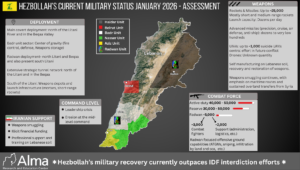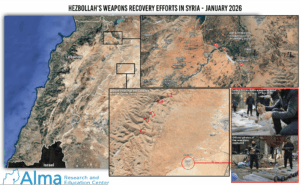A new wave of violent clashes has erupted in recent days between Druze and Bedouins in the Suwayda Governorate in southern Syria, apparently after Bedouin tribesmen set up roadblocks in the area. One of the events that sparked the outbreak of violence occurred on July 10, when armed Bedouins manning a roadblock robbed and assaulted a Druze merchant. This incident provoked anger among the Druze population in Suwayda, leading to a series of mutual attacks and abductions, and a broader escalation of the conflict.
The clashes, which began in the Al-Muqous neighborhood of the city of Suwayda initially took place within the city itself and later spread to additional surrounding villages. The fighting included machine gun and mortar fire, as well as the blocking of key roads in the region. During the clashes, Druze forces managed to seize control of Sunni neighborhoods in the city as well as other areas surrounding Suwayda.

The spread of the fighting and its explosive potential to ignite additional areas in Syria prompted the regime to intervene by deploying military and internal security forces to the region. In addition, the governor of the province, local dignitaries, and sheikhs called for an end to the violence.
As of right now (July 14), it appears that the fighting has mostly subsided and that most of the abductees have been released through the mediation of local religious leaders and dignitaries. According to various reports, there are several dozen fatalities and close to 100 wounded.
These clashes, once again exploited by various political actors both within Syria and abroad, are yet another testament to the ongoing tensions in the country and the challenges facing the new regime as it attempts to rebuild Syria. While Druze sources have warned of a potential massacre in the Suwayda Governorate, spokespeople aligned with the Bedouin tribes claimed that the Druze are sowing chaos in the country in order to harm Sunnis. Other parties have used the events as an opportunity to criticize the new regime.

There is no doubt that sectarian and religious tensions in Syria will continue to be one of the most significant internal challenges facing the regime in its path toward stabilizing and unifying the country. Moreover, this issue has serious implications for Syria’s reconstruction, as the treatment of minorities in the country is one of the key metrics by which the regime will be evaluated—and this could influence the level of assistance it receives from European nations.
The state of relations between the regime and the country’s major minorities remains complex. While the Syrian regime has appointed a governor on its behalf to the Suwayda Governorate and there is some government activity in the province, Druze forces have still not been integrated into the military or regime forces. Despite the fact that the regime signed an agreement with them back in March, most of it has not been implemented, and there are still reports of clashes between Druze and regime forces. Tensions also remain high with the Alawites, especially following the massacre carried out by regime forces against residents in the coastal region.






One Response
Dear Boaz,
The destabilizing fingerprints of jihaddist forces of chaos are all over this eruption. To allow the religious and ethnic lie to be used as a cover is inexcusable. In short: Al-Julani the jihaddi is responsible for each dead body! Their blood is upon his head, and he too will soon be dead!